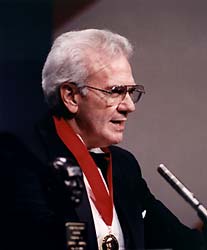In the first two parts of this series, I addressed some of the ideas regarding higher education that are being promoted by various candidates for president of the United States. In Part 1, I examined the wisdom and folly of eliminating tuition at public colleges and universities. In Part 2, I raised the inconvenient question of what problem the solution of free tuition is intended to solve – and what unintended consequences might result from such a policy. Now, in Part 3, I want to consider yet another factor that explains why there is such divergence of opinions regarding higher education on the part of our presidential candidates.
Tag Archives: Purpose
The New American College – Two Decades Late
Perhaps the late Ernie Boyer’s argument – service to society as the primary mission of higher education – hasn’t been abandoned altogether
The late Ernest Boyer was a hugely influential voice in higher education policy during the latter part of the 20th century. He was the chancellor of the giant State University of New York (SUNY) system, before becoming the U.S. commissioner of education (a position that later was changed to “secretary”); he ended his career as the president of the Carnegie Foundation for the Advancement of Teaching.
Boyer was very comfortable taking on the higher education establishment and calling out its weaknesses as he perceived them. For example, he believed that American higher education began to lose its way after WW-II, when the National Science Foundation was established (1950) and the National Institutes of Health were greatly expanded, making federal research dollars available, in increasingly larger amounts, to campus-based researchers. Boyer was visibly concerned that the growing emphasis on university-based research was coming at the expense of the historic emphasis on high-quality undergraduate education.
What Is the Purpose of Higher Education? (Part 4)
The Roger Williams University Story
Part 1 of this series, “Attack of the Politicians,” discussed the widespread notion that higher education’s purpose is, first and foremost, to prepare students for the workforce. Part 2, “Higher Education Strikes Back (Weakly),” focused on the idea that higher education actually serves a multitude of purposes, preparation for a career being perhaps the most important, but far from the only, purpose. Part 3, “A New Hope,” considered the findings of a Gallup-Purdue study that correlated particular experiences and opportunities students had as undergraduates with a subsequent rich and fulfilling life – and surely “a great job and a great life” is something that all prospective students (and their parents) desire.
What Is the Purpose of Higher Education? (Part 3)
A New Hope
In Part 1 of this series, “Attack of the Politicians,” I pointed out the growing consensus, particularly among some prominent Republican governors, that the primary purpose of higher education is to prepare students to obtain a well-paying job after graduation. In Part 2, “Higher Education Strikes Back (Weakly),” I noted the fragile balance struck by higher education faculty, regardless of whether their particular focus is in the liberal arts, in professional or applied fields, or in community college teaching, in support of the notion that higher education is a big tent, and there is room for several different purposes and outcomes for a college education. Different campuses have different missions; there is no single purpose that encompasses all of them.
What Is the Purpose of Higher Education? (Part 2)
Higher Education Strikes Back (Weakly)
In Part 1 of this series, “Attack of the Politicians,” I pointed out just how pervasive has become the branding of higher education by politicians and media pundits as being primarily – even exclusively – a mechanism for job preparation. And this idea is apparently not a passing fad. The idea that the value of college is to provide the training young people need to “get a good job” is being treated as a truism among a number of probable candidates for the Republican nomination for president in the 2016 election. In Part 1, I quoted Gov. Scott Walker of Wisconsin as a specific example.
Because the proposition that the purpose of higher education is job preparation is likely to become even more prominent in the coming months, it is important that we consider the origins and merits of this idea.
What Is the Purpose of Higher Education? (Part 1)
Attack of the Politicians
Recently, Gov. Scott Walker of Wisconsin, who some consider a potential contender for the Republican presidential nominee in 2016, has been in the news for comments he made when announcing his proposed state budget (The New York Times, Feb. 4 and Feb. 17, 2015; Inside Higher Ed, Feb. 5 and Feb. 16, 2015). In addition to calling for a $300 million, two-year cut in state appropriations to the University of Wisconsin system (a 13 percent reduction from its current appropriation), Gov. Walker also called for a change in the university’s mission statement, removing century-old language such as “search for truth,” and “improve the human condition,” and substituting instead “meet the state’s workforce needs.”

